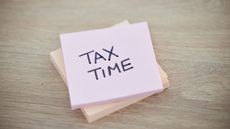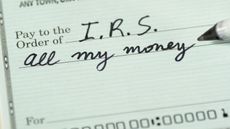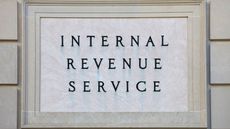Etsy, eBay, PayPal Want IRS 1099-K Relief for Online Sellers
Companies like ebay, Etsy, and PayPal want Congress to raise the new $600 reporting threshold for IRS Form1099-K to give relief to millions of sellers who use their sites.
- (opens in new tab)
- (opens in new tab)
- (opens in new tab)
- Newsletter sign up Newsletter


Online shopping sites like Etsy, and eBay, and payment network PayPal, among other companies, want Congress to change the new $600 reporting threshold for IRS Form 1099-K. The rule which currently applies for 2023, affects millions of people who sell on sites like Airbnb, and Poshmark, and get paid through third party networks like PayPal, Square and CashApp.
Previously to receive a 1099-K, you had to have at least 200 third-party payment network transactions totalling more than $20,000 in gross payments. Now, in 2023, a single transaction on a payment network of just $600 can trigger a 1099-K. Some people call this the “600 rule.” Implementation of the rule was delayed last year by the IRS, but the change and the delay continue to cause confusion.
Now, the Coalition for 1099-K Fairness (a group of online marketplaces that oppose the new rule) is urging Congress to get involved. The goal is to have bipartisan legislation that raises the 1099-K threshold, giving relief to “casual sellers”– millions of people who are paid smaller amounts through third party networks who haven’t received 1099-K forms in the past.

Sign up for Kiplinger’s Free E-Newsletters
Profit and prosper with the best of expert advice on investing, taxes, retirement, personal finance and more - straight to your e-mail.
Profit and prosper with the best of expert advice - straight to your e-mail.
Is the IRS unfairly targeting casual sellers?
PayPal, eBay (opens in new tab), and Etsy are among several members of the 1099-K Fairness Coalition that want Congress to ensure that casual online sellers aren’t burdened with the IRS 1099-K form. The organization cites a 2022 national survey of sellers where:
- 70% of respondents said they would be deterred from selling online because of the $600 IRS 1099-K reporting requirement.
- 85% percent of those surveyed didn’t think that the IRS should be “targeting people who only occasionally sell online,” according to the survey.
Members of the Coalition for 1099-K Fairness include: Aribnb, Bikelist, eBay, Eventbrite, Block, Inc. (for Square and CashApp), ETA, Etsy (opens in new tab), Goldin, Kidizen, Mercari, Noihsaf Bazaar, OfferUp, PayPal (opens in new tab), Poshmark, Inc., Reverb, Rover, Sports Fan Coalition, StubHub, TechNet and Tradesy.
According to the Coalition, many of the transactions that casual sellers have “involve the sale of used goods that do not create any tax liability.” (Some of those goods are often sold for less than what the seller initially paid). The organization says on its website, that the new IRS $600 rule would disproportionately burden some taxpayers, who could be at risk of over-reporting their income or “forced to hire a tax professional” to ensure compliance with the reporting requirement.
The Coalition also points out that economic hardship is another factor for nearly 40% of online sellers. The vast majority (nearly 75%) said that they sell online to help pay for necessary personal expenses.
1099-K: What could Congress do?
The Coalition for 1099-K Fairness wants Congress to pass legislation that would increase the 1099-K reporting threshold. If Congress doesn’t act, the organization says that millions of people with relatively small online businesses will receive 1099-Ks for the 2023 tax year. The coalition says that could cause significant confusion and administrative challenges–not only for networks and sellers, but for the IRS as well.
In Congress, the Saving Gig Economy Taxpayers Act has recently been reintroduced in the U.S. House of Representatives with bipartisan sponsorship.
- The legislation would repeal the IRS 1099-K $600 rule and restore the previous $20,000/200 transaction threshold.
- It’s unclear right now what will happen with the legislation, which is similar to proposals that circulated in Congress last year but failed to gain enough support to pass.
For now? The $600 1099-K reporting rule doesn’t apply for the current 2022 tax filing season. But keep in mind that the IRS expects you to report all taxable income on your federal return, whether you receive a 1099-K or not.

With more than 20 years of experience as a corporate attorney and business journalist, Kelley R. Taylor has contributed to numerous national print and digital magazines on key issues spanning education, law, health, finance, and tax. Over the years, Kelley has extensively covered major tax developments and changes including the "Trump" tax cuts (TCJA), pandemic-era changes in ARPA, the SECURE 2.0 Act, and the numerous clean energy tax credits in the Inflation Reduction Act. Kelley particularly enjoys translating complex information in ways that help empower people in their daily lives and work.
-
-
 Longevity: The Retirement Problem No One Is Discussing
Longevity: The Retirement Problem No One Is DiscussingMany people saving for retirement fail to take into account how living longer will affect how much they’ll need once they stop working. What should they do?
By Brian Skrobonja, Chartered Financial Consultant (ChFC®) • Published
-
 Capital Gains Taxes Trap: How to Avoid Mutual Fund Tax Bombs
Capital Gains Taxes Trap: How to Avoid Mutual Fund Tax BombsIt’s bad enough when your mutual fund’s assets lose value, but owing unexpected capital gains taxes after those losses is doubly frustrating.
By Samuel V. Gaeta, CFP® • Published
-
 How to Lower Your Tax Bill Next Year
How to Lower Your Tax Bill Next YearKnowing how to lower your tax bill (pay less taxes) when it's time to file your return next year requires some strategizing through the rest of 2023. Here are some tax tips to help make it happen.
By Katelyn Washington • Published
-
 Indiana Storm Victims Have an Extended IRS Tax Deadline
Indiana Storm Victims Have an Extended IRS Tax DeadlineIndiana taxpayers impacted by recent severe storms have an extension of the April 18 deadline to file federal tax returns.
By Katelyn Washington • Published
-
 IRS Says File Soon for $1.5 Billion in Unclaimed Tax Refunds
IRS Says File Soon for $1.5 Billion in Unclaimed Tax RefundsUnclaimed tax refunds from 2019 are waiting for millions of people who might not know it – but only if they file the pandemic-era tax return soon. Are you one of them?
By Kelley R. Taylor • Published
-
 Tax Tips for Last-Minute Filers
Tax Tips for Last-Minute FilersTime has run out for most people to file taxes for 2022, but these tax tips could help you file soon after the tax deadline and possibly keep more money in your pocket at the same time.
By Katelyn Washington • Published
-
 How to Pay the IRS if You Owe Taxes
How to Pay the IRS if You Owe TaxesThere are several ways to pay the IRS if you owe taxes, but just because you can pay your tax bill over time doesn’t always mean you should.
By Katelyn Washington • Published
-
 Who is Required to File a Tax Return, and Who Isn't
Who is Required to File a Tax Return, and Who Isn'tIf you meet certain income requirements, you are required to file a federal tax return (or get an extension) by Tax Day. You could face penalties if you don't.
By Katelyn Washington • Published
-
 California Tax Deadline Extension: What You Need to Know
California Tax Deadline Extension: What You Need to KnowSome Californians have more time to file federal and state tax returns because of natural disasters.
By Kelley R. Taylor • Published
-
 IRS Says Some Stimulus Check Recipients Should File an Amended Tax Return
IRS Says Some Stimulus Check Recipients Should File an Amended Tax ReturnSome early filers who received state "stimulus" payments may need to file an amended tax return to possibly get a refund.
By Kelley R. Taylor • Last updated









